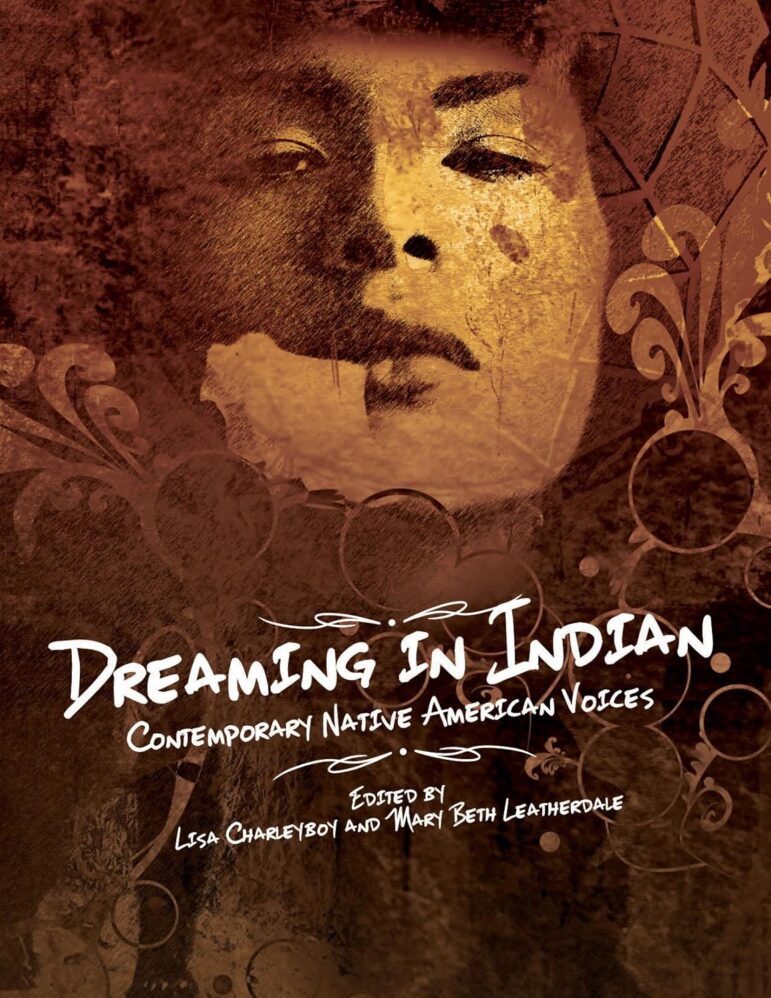
I’ve always been against cultural appropriation. It’s a sensitive topic for me because I know what it feels like to have your heritage mocked, your roots, your family, and all those who came before you, reduced to a joke or a “thing” that others can use as they please.
I’ve been looking for meaningful books written by Native American authors, and I found an impressive one at my local library: 2014’s Dreaming In Indian: Contemporary Native American Voices, edited by Lisa Charleyboy and Mary Beth Leatherdale.

Cover to “Dreaming in Indian: Contemporary Native American Voices” [
Divided into four sections – ‘Roots,’ ‘Battles,’ ‘Medicines,’ and ‘Dreamcatchers’ – this book offers readers a unique insight into a community often misunderstood and misrepresented by the mainstream media.
I started reading with an open mind. We all know unconscious bias and preconceived notions about something we haven’t had direct contact with, so I wanted to keep that under control as much as possible. I found it an effortless thing to do with this reading because of how easy it is to relate to the feelings of struggle, rejection, self-loathing, the will to overcome obstacles, and even more with the search of identity unexpectedly ending in your own name.
The different accounts, the experiences, the styles, and multimedia approach to all these histories left me out of breath and words. It’s full of honesty, assertiveness, pride, and hope, not just words that carry a powerful meaning, but a whole culture showing a raw, unapologetically picture of itself.
Reading it put things into perspective for me. It reminded me of the stories of my own relatives being mocked, disrespected, abused, due to our Syrian ancestry. I also experienced it growing up as the only Arab kid in my classroom. There was even a day, at 13, when one of my classmates, who made fun of me every single day, said that his grandmother passed away. I was so fed up that I held back a smile when I saw him so sad, and all of a sudden, he made fun of me again.
It made me realize that some people don’t know what it feels like, when their identities are so hollow they need to pretend it’s strong enough to crush someone else’s. That day I gave up on caring about what anyone else said to me regarding my being Arab. The day I finished that book, I understood better that there’s not such a big difference between me and Natives. There’s not a big difference, in the end, between any of us, but that doesn’t entitle us either to claim something that has never been ours.
The many accounts, the glimpses I got about Native culture, showed me that even though no one owns a culture, it’s a matter of respect and sympathy. It’s not that you’re not allowed to know more about it, or even practice it, it’s a matter of learning from the communities themselves and then giving back to them without claiming authority.
There are several sensitive topics included, as expected from an anthology of real-life events, that shows how similar we all are in the end, how human we can be, and what it feels to be labeled as “the other.”
![]()
We hate to keep asking, but it is serious. Costs have hit us too.
We are grateful to our readers for your support, however it manifests. Right now, we need readers who can help fund Pagan journalism to help us continue serving the community. This is the type of story you only see here. This is how to help:
Tax Deductible Donation | PayPal Donations | Join our Patreon
We remain one of the most widely-read news magazines within modern Paganism, and our reporters and columnists remain dedicated to a vision of journalism for and about our family of faiths.
You can also help us by sharing this message on your social media.
As always, thank you for your support of The Wild Hunt!
![]()
It’s a book that speaks to the very heart of the reader without holding back in any way: you get the good, the bad, the glorious, and the miserable in equal measure, ending with a clearer vision of the Native American communities, their diversity, their lives, and their talents.
As a Pagan and as a Witch, I think it’s important to know where we’re getting our magic from. As a human, I advocate for equity and justice. With so many cultures in the world, with one we can call our own, why should we get fixated with one we’re not part of? I’m already Arab, for example, and grew up in Venezuela. There are already two cultures I am part of, each with folklore and myths to get inspired by, each with a history to learn from.
I can learn about Native Americans as well, I would love to learn from them if given the chance, and use my privilege as a White-passing person to help them be heard. But at the end of the day, why would I prioritize another one when I have my own? Don’t even get me started on cultures that go beyond your blood: your gender, your sexuality, your age, your generation, the place you live at, the things you enjoy, subcultures (such as we Goth people), and so on.
As cliché as it sounds, we don’t need to look outside for what’s already inside of us.
Publisher: Annick Press (July 24, 2014)
Publication date: July 24, 2014.
Reading age: 12 years and up.
Print length: 128 pages, Hardcover
The Wild Hunt is not responsible for links to external content.
To join a conversation on this post:
Visit our The Wild Hunt subreddit! Point your favorite browser to https://www.reddit.com/r/The_Wild_Hunt_News/, then click “JOIN”. Make sure to click the bell, too, to be notified of new articles posted to our subreddit.